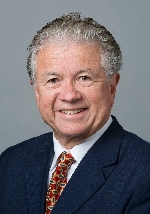Problematic massage parlors surface in Ward 3 race
Prostitution rhetoric has been thick and plentiful in the Ward 3 City Council race in Las Vegas, and now one candidate is upping the stakes by accusing the city of turning a blind eye to "massage and escort services that are really fronts for the illegal sex trade business."
"They haven't been looking at it," said candidate and former legislator Bob Coffin. "I see too many of them. Anecdotally, everybody knows that a lot of sexual favors are granted in these places for cash."
Coffin said the city should use its business inspection powers to put more pressure on suspect massage businesses: surprise inspections, credential checks and penalties for violators.
Of course, promising to crack down and doing it are different things. Stripping a misbehaving business's license is a lengthy process that in these cases usually involves a police investigation.
City officials say they have been vigilant about massage parlor complaints as well as who can be licensed to open one.
This discussion appears to be more about politics than policy because making the accusation allows Coffin to point a finger at his opponent, Adriana Martinez, who is a city employee.
She is on leave from her City Council liaison job for Councilwoman Lois Tarkanian to campaign for office.
"The proliferation of these businesses has been largely ignored by City Hall (where Adriana Martinez works), especially in Ward 3," a Coffin mailer reads.
Martinez has gone after Coffin for his legislative record of proposing a tax on legal brothels and for saying he would listen to proponents of legalizing prostitution statewide, even though he is opposed to it.
Both candidates liked the idea of providing the police with more resources to attack the problem because illegal prostitution is connected to the spread of venereal diseases, the abuse of women and children, and human trafficking.
"It's a ton of work" to shut down one business, Martinez cautioned, much less to build a case against several. She defended the city's process, but she said there are instances where the city could react more quickly once problems are reported or arrests made. Investigating businesses where nothing untoward has been reported would stretch the city's code enforcement staff, she said.
"It would be a waste of resources to target certain businesses," she said. "If we start hearing complaints, then we have to investigate."
That's the way it works today.
A complaint finds its way to the city or to the police, for example, someone reports that more than just a massage is available at a business. Police usually will go undercover to see whether prostitution is available at the business, make arrests and report the results to the city's business licensing division. If the business is to be disciplined, the City Council often is involved, and the punishment can go all the way up to revoking the business license or hefty fines in addition to criminal penalties.
Since 2007, the council has closed four massage parlors, three that were near the intersection of Sahara Avenue and Paradise Road and one on Sahara across from Palace Station, and has denied licenses or permits to four others.
No escort services, which introduce women to clients under the guise of simply allowing them to spend time together, are licensed in Las Vegas. There are about 50 licensed massage establishments in the city, not counting those attached to a spa or chiropractor's office.
"I don't think we're ignoring it, I'll say that," Tarkanian said. Her office spent two years trying to shut down Oriental Angels Massage, which was across from Palace Station, before succeeding last year. "I think we're trying hard on that."
Still, the massage license is what's known as a "privileged" license, which carries additional responsibilities for the business, Coffin said, just as a liquor or gaming license would. There are many legitimate massage therapy businesses around town that suffer because they are in the same licensing category as shady operators that set up near the Strip.
"You have to weed them out," Coffin said. "You have to find out who deserves a business license. "
City officials don't have to wait until a complaint is received to check out a business, City Attorney Brad Jerbic said. In fact, council members regularly request enforcement when they see problems in a neighborhood or with a business.
"That happens all the time," he said. "That's one of the things council members are elected to do."
Examples include bars that disturb neighborhoods, stores selling alcohol to minors and, in one case, a tobacco shop that was allowing customers to smoke synthetic marijuana in the store, even though the product is labeled as unfit for human consumption.
Las Vegas already limits the hours massage businesses can be open, although some are grandfathered in for later hours. Licensees also have to go through a background check.
"We found out a lot of the activity was late at night, and we have a lot of them that have agreed to close their doors at nine o'clock," Jerbic said.
The city relies on complaints because staff time is limited, and police undercover stings take time and money. Random checks are possible, even necessary, Jerbic said.
"Businesses that perform services or render services that could be abused -- people who sell liquor, people who sell cigarettes, people who engage in cross-gender massage -- those are higher-risk," he said. "We know the only way sometimes to keep them on their toes or to look into them is to do a random check."
There's another, more drastic step the city could take: Don't let women massage men. In 2009 Clark County became the last government entity in Southern Nevada to allow cross-gender massages.
"We could look at some of those laws and say, 'Are these the kind of establishments that are just naturally going to lead to this kind of activity?' " Jerbic said.
Martinez's answer was no.
"People should have a choice," she said. "If there's an excellent massage therapist who happened to be a male massage therapist, I'm not going to turn him down if my knee's out of whack."
Coffin said the idea could be worth a look if problems persist.
"It's a possibility," he said. "If we can't control what we have, then we may have to revisit the more stringent regulation."


















